Review of HTC Touch 2 – Establishing Rules
Despite of several outstanding communicators in the top-end segment HTC isn’t going to miss a chance of having more control over the market. To do that they’ve both struggled for the first place between Google Android-based devices and produced first mass device based on Windows Mobile 6.5.Table of contents:
- Introduction
- Design
- Hardware
- Software
- Touch FLO
- New Experiences with Windows Mobile 6.5
- Performance
- Connectivity
- Music
- Ðàäèî
- Camera
- Others
- Phone Quality
- Conclusion
Introduction
Until recently one of the HTC’s main problem was that they plan to expand the sphere of influence without developing the market. Consequently the company faced some problems in meeting consumers’ demands for a reasonably priced interesting device. Instead HTC had several years running the Motorola-like conception of covering different price segments, i.e. when a small number of devices becomes affordable only a year after the sales started. Only this secondary method allowed to buy HTC Touch in the year 2008, and HTC Touch Diamond – in 2009. But at that time had been getting less and less timely. Of course, they produced some inexpensive models, e.g. Pharos, or Gene a year earlier, but these devices were just run-of-the-mill solutions, which proved that the company hadn’t concentrated on that market segment. It was rather regrettable situation in spring which allowed the rivals, namely LG and Samsung, to develop their touch-screen devices based on the proprietary OS.
Having allowed to do that, HTC quickly realized the problems of the one-sided development of Google-Android solutions, thus without putting Windows Mobile aside, the company divided such solutions into mass and top-end segments. Consequently, Android devices vary from $450 to $770 in Russian retail trade. The cheapest group is now enlarged by renewed Touch 2 solution. Whether it’s strange, or not, we think, this model has a good chance to become the most successful one among other HTC devices announced in 2009. Thus let’s directly move to the description of HTC Touch 2.
Design

Classic solutions can be changed greatly, but almost everyone can admit, that the classical design can be used over and over. And it is the case of the Touch 2, which adopted the design of the first model produced in 2007. Our guest hasn’t changed much for the past several years. But those changes we see are worth justifying because of the improved ergonomics, though the main feature of the previous solution remains practically unchanged.

What is meant here, is the dimensions, which are rather compact: 104.1 x 55.2 x 12.9 mm, but slightly bigger than the Touch 1. In comparison with the Diamond 2 our guest looks tiny. It is notable, that though trying to retain small size and rather low price, HTC haven’t saved on materials quality. Thus the guest of the review can boast the usual soft matt plastic with rubberized Soft Touch coating, while the ends shine with a contrast chrome-like glossy coating.


As to the tactile feedback, the device remains rather pleasant feeling, thanks to the good types of plastic used in the casing. To make it better, the build quality traditionally has no gaps and squeaks. The positive impression is intensified by no desire to make it as light as possible. Thus the Touch 2 weighs 108g and can be easily carried in the shirt breast pocket or in the jeans where it becomes imperceptible due to the narrow and thin case.


The front panel of the communicator looks like the one made in 2007, i.e. it has minimum of glossy parts, the others are matt. The top part of it has through small holes hiding the earpiece in the middle instead of the cut, we used to. To the left of it you find three charge indicators.


Below you see a standard resistive sensor glass protecting 2.8” TFT screen with 240x320 res. The matrix seems to be out-of-date a bit, given that the most devices of this segment widely utilize VGA screens, though, some users can view it as an advantage. Putting aside the grainness of the picture, we can attract your attention to the good colour rendering and viewing angles, that come up to 160 degrees in both planes.


Speaking about the screen work in the sun light, we don’t have any advantages to mention, as a picture fades up for 2/3, and twice loses its sharpness. Plus the moderate resolution plays bad trick at that moment, as the interface prints are far from being tiny.


The space under the screen utilizes a smart sensitive zooming bar, which we’ve mentioned in the review of Touch Pro 2. It has no backlight.

The last control elements placed on the front panel is the matt space with five short-traveled buttons. The call send and end buttons on the flanks are similar to the others except for the indistinct rims. They frame slightly jetting out Home and Start buttons. The latter is combined with the Return key. They all feature distinct clicks. The bar has an even white backlight.



All interesting elements on the sides are placed in the silvery frame, that widens in the bottom framing the standard ExtUSB-slot for accessories and charge. It is topped with a mic hole.

The top end is interesting for the cut serving to pull out the battery cover, as well as the standard 3.5mm headphones jet, which was used for the first time in HTC Hero.


The left side boasts a solid volume rocker key, which is very handy in use, unlike the nearby plug of the microSDHC-memory card slot, which can be opened only after removing the rear cover. The right side of the device is free from elements, except a head of the standard small stylus, which is fixed in the slot without any magnet.




A rear fascia of HTC Touch 2 made of the matt Soft Touch plastic is used as a battery cover. Its bottom part has a strip hole. On the top of the fascia you can see an interesting element – a slightly prominent unit of the 3 megapixel camera with a loudspeaker grill nearby. This solution looks rather interesting, but can be worn out after six months in use.



Traditionally, the battery cover can be removed, after you unlock the latches on the sides. The device is equipped with the 1100mAh battery, which lasts 2 days in use, which include 190 minutes of talks, 120 minutes of music, plus WEB-browsing via Wi-Fi, and one hour of text reading. If you use it less frequently, the battery will need charging in three days given the small screen.

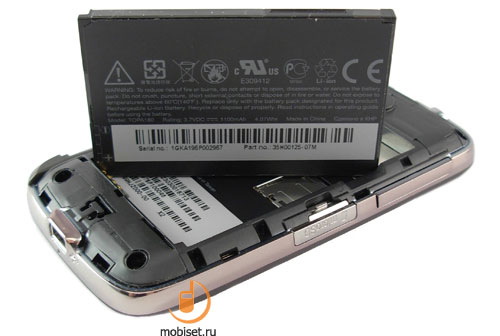
The battery hides the SIM-card slot with the latch. The latter makes you try harder to pull out the sim, but some time later you’ll get used to it. You can find a memory card slot there, which proves to be handy, though, at first you may think the opposite. Despite the awkward plug, the data transfer speed via this connection is rather high.
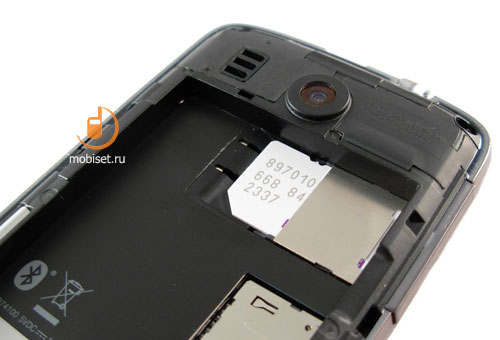

Other photos:
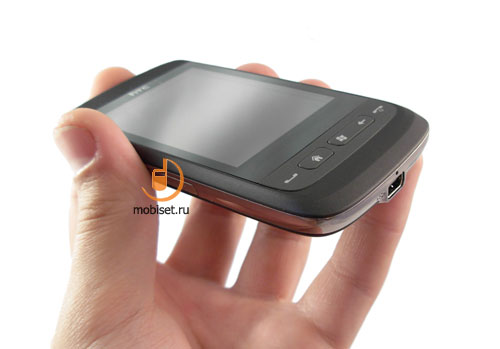
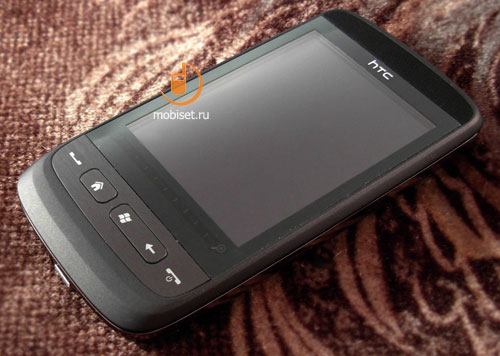
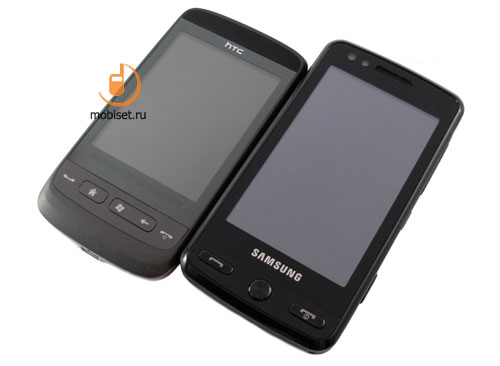
Hardware
Unlike the most communicators with the same price tag, HTC Touch 2 has almost the same hardware, as the more functional devices of the company. It is too early to speak about standardization. The device is running 528 MHz Qualcomm MSM 7225 processor. Though it lacks 3G support, it has QTy Display video decoder, which makes it easy to play back video. Everything is good with the memory. The device has 256RAM. The user gets 110MB at his disposal. There are also 512 MB ROM. 280MB of which can be used in different ways.



Software
Given Touch FLO 3D 2, our guest can hardly surprise you with its main peculiarity, namely advanced Windows Mobile 6.5 Professional, which is undoubtedly worth speaking about. This model not just combines new OS and HTC shell, as Touch FLO 3D proves to be a simplified shell with a common graphics and animation, the same as in Touch Viva.
So, let’s start with a consumer version of Touch FLO, proceeding to WM 6.5.

Touch FLO
Regardless the simplified graphics of the shell, it does have the functionality of the original shell installed in Touch Diamond 2. It means that you can see the same icons on the top bar. There are 11 tabs. You can move between them scrolling the horizontal list. To do that you need not to just moving a finger aside, but to hit the necessary icon among those moving in the opposite direction. The most interesting thing is the multimedia apps for video and pictures, as well as music. There are tabs for phones, IE 6.5 web browser, as well as different other programs. You can also use the tabs for messages, email and weather. The latter is not exciting at all, as it has no nice animation.

















There is also settings tab, which includes the most frequently used ones, among them – Wallpapers, Sounds and Communications.





To cap it all, we’d like to mention a new Map Search application, which uses Google maps to make it easy for a user to search for different places, from cafes to theatres. Considering the fact, that the search is done via Maps, you can entirely rely on the provided information.










New Experiences with Windows Mobile 6.5
Microsoft undoubtedly will paint a rosy picture of all OS features comparing it with the previous one in its press releases. But the users will be “involved in it” as much as in, for example, new CE 5.2.21828 kernel, while the changed design looks rather interesting.
After switching on the device you see a standard stand-by Today screen, which saves all the elements as they used to be.




The Start menu has seen great changes, which the company first implemented in HTC Touch Pro 2. It is the full-screen menu consisting of either the icons, which are arranged in the V-like order or folders in the program section. It is interesting, that the menu has no option to switch to the classic arrangement of the icons, but the way the user works with the device hasn’t changed at all. Another nice feature is handy scrolling, which doesn’t drag or unexpectedly change the pictures.






The second change concerns the interface too, to be particular, the popping-up windows. To control them you don’t need the stylus, as their large size and kinetic scrolling makes them rather finger-friendly. Though, many other devices can boast the same feature, we can’t but praise it.










Performance
Let’s move directly to the performance and speed of work. Unfortunately we have to evaluate the speed of work roughly. For example, our guest launches MS Word for ó second quicker than Touch cruise. Then, we notice, that the navigation through the menu, as well as the work with the apps is 10-20% faster. It proves that the reason is not in the better OS structure, but some problems in Windows Mobile 6.1.
But let’s move back to the performance of Touch 2, which is evaluated by the on-board utility Core Player, which is measured the maximal rate of video play back. We took the standard file and got the following results:
Sample 1: 320 x 188, 464 Kbit/s
285.62%, 1.33 Mbit/s.
The result isn’t unexpected at all. You can use HTC Touch 2 for viewing uncoverted video, if a file isn’t more than 700MB with 1Mbit/s bitrate.




Connectivity
The device can be wired with a PC via either any miniUSB cable or the one from the salespack, which is equipped with ExtUSB-jack. When wired, the device shows an option between Active Sync 4.5 connection and Disk Drive, which provides 5-6MB/s file transfer.






The installed Bluetooth 2.1 supports almost all profiles available, including EDR, A2DP and FTP. The latter provides convenient work with memory arrays in the selected devices. As to the headsets, the problem lies in Microsoft drivers. The data transfer to the devices supporting EDR is about 130Kbit/s. that is twice as quicker as its predecessors.





As there is hardly any Top-End device without Wi-Fi, our guest traditionally has Wi-Fi IEEE 802.11 B/g. it is possible to connect to WLAN hotspots either via OS with special drivers or a special utility in Communication Manager.





Music
We have been waiting for a 3.5 headphones jack to be installed in HTC communicators for long time, and it does appear in Touch 2. Thus, we decided to enjoy examining the sound quality more attentively. So let’s start with the standard apps to play music.
The most convenient way to listen to music in the Touch FLO-equipped device is an audio manager. You can use it when you utilize the device as a player. The player library is updated each time you start the shell. Initially you see the list of all tracks, which can be switched off when taping the header. The tracks can be sorted out by artist, album, playlist, genre, composers.
The play back mode has no difference from the one, we’ve seen in Touch Diamond. And there is no need for changes. You switch between the tracks either by moving the finger upwards on the album cover, or by pressing tiny keys placed near Play/Pause button.









Concerning the sound settings and the play back mode, the player is unlikely to satisfy all the needs, thus, the manufacturer installed a special utility. Instead of the player equalizer HTC Touch 2 is equipped with Audio Booster, the sound adjusting system, which includes ten-bands with a dozen of presets and manual adjustment to enable the customization. We can tell you in advance, that the work of equalizer is perceivable, while the sound quality of the device allows to adjust even the extreme values.





And here we come to the most interesting part of the player review, notably the sound quality produced by the HTC Touch 2 with the third-party headphones. This is important, as the device comes at the market with a simplistic headset with earbuds, which are fit only for the podcasts and audiobooks. Besides, without using the third-party earphones you are hardly notice good maximum volume, which is enough to exceed the noises in the underground. With the standard Sennheiser CX500 earbuds you’re able to use just 70-80% of full volume. The sound turned out to be indistinctive both in high and low frequencies and a bit flat in the middle ones, which is especially disappointing, when you listen to Rock or Heavy Metal, while Electro sounds pretty clearly, thanks to almost even AFC and imperceptible background noise of the 20 mW amplifier. The device also meets the needs of Pop and Lounge music fans.
Summary
| Frequency response (from 40 Hz to 15 kHz), dB: | +0.09, -0.48 | Good |
| Noise level, dB (A): | -84.8 | Good |
| Dynamic range, dB (A): | 86.1 | Good |
| THD, %: | 0.015 | Good |
| IMD + Noise, %: | 0.130 | Average |
| Stereo crosstalk, dB: | -83.9 | Very good |
| IMD at 10 kHz, %: | 0.066 | Good |
General performance: Good
Frequency response

| Frequency range | Response |
| From 20 Hz to 20 kHz, dB | -1.81, +0.09 |
| From 40 Hz to 15 kHz, dB | -0.48, +0.09 |
Noise level

| Parameter | Left | Right |
| RMS power, dB: | -82.4 | -83.8 |
| RMS power (A-weighted), dB: | -82.4 | -84.8 |
| Peak level, dB FS: | -69.2 | -70.7 |
| DC offset, %: | -0.00 | -0.00 |
Dynamic range
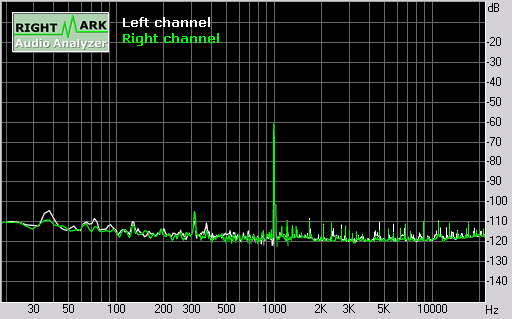
| Parameter | Left | Right |
| Dynamic range, dB: | +84.3 | +85.0 |
| Dynamic range (A-weighted), dB: | +86.1 | +86.7 |
| DC offset, %: | -0.00 | -0.00 |
THD + Noise (at -3 dB FS)
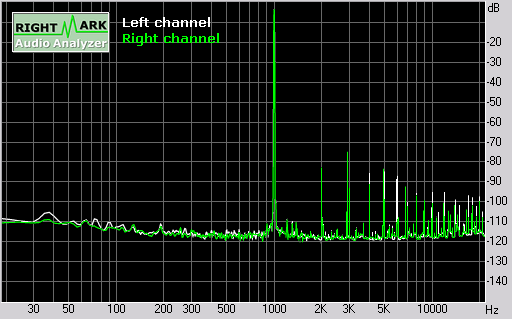
| Parameter | Left | Right |
| THD, %: | 0.0175 | 0.0151 |
| THD + Noise, %: | 0.0343 | 0.0315 |
| THD + Noise (A-weighted), %: | 0.0428 | 0.0399 |
Intermodulation distortion
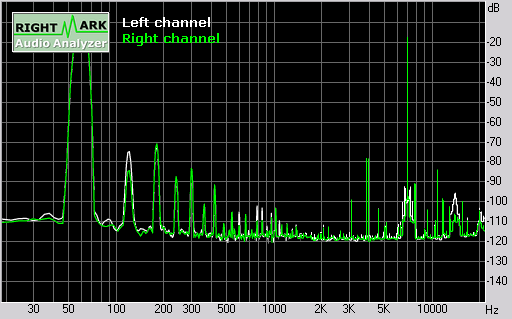
| Parameter | Left | Right |
| IMD + Noise, %: | 0.1329 | 0.1297 |
| IMD + Noise (A-weighted), %: | 0.1202 | 0.1195 |
Stereo crosstalk

| Parameter | L <- R | L -> R |
| Crosstalk at 100 Hz, dB: | -84 | -82 |
| Crosstalk at 1 kHz, dB: | -83 | -82 |
| Crosstalk at 10 kHz, dB: | -85 | -85 |
IMD (swept tones)
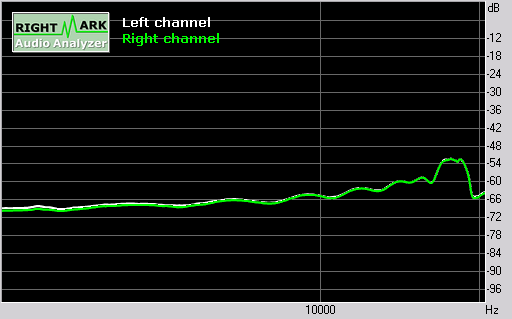
| Parameter | Left | Right |
| IMD + Noise at 5 kHz, %: | 0.0412 | 0.0395 |
| IMD + Noise at 10 kHz, %: | 0.0586 | 0.0577 |
| IMD + Noise at 15 kHz, %: | 0.1011 | 0.1001 |
Radio
Touch 2 is equipped with a good FM radio, which has 87.5-108 MHz frequency range and saves up to 20 radio stations. The interface looks rather common, but still is more convenient than the ones installed in other WM-based communicators.








Camera
HTC Touch 2 is equipped with 3.2 megapixel camera without flash and autofocusing. This can be justified only by the fact, that another device of the company, that is twice more expensive than our guest has the same maximum resolution. But it is less troubling, than the lack of any dedicated camera key. Instead of it, the user has to work with the touchscreen key, which is set on the full-screen viewfinder. Besides, by touching any free space on the screen you can call up the camera settings, which include albums, modes and others.




The settings allow you to adjust brightness, contrast and ISO. If you need more settings, go to the advanced ones. They are as follows: self-timer, resolution, effects, shutter sound and flicker adjustment.










The communicator can boast the video recording function, but its quality is obviously poor. The figures of the maximum resolution (352x288) and 10-15f/s speed prove the point, even without video samples.







The photos quality isn’t worth close attention, as we have just a middle-end device with a mediocre camera, which is used to produce shots viewable at the communicator only. Thus the photos below look good.
 [+] maximize, 2048x1536, JPEG, 673 KB |  [+] maximize, 2048x1536, JPEG, 359 KB |
 [+] maximize, 2048x1536, JPEG, 608 KB |  [+] maximize, 2048x1536, JPEG, 593 KB |
 [+] maximize, 2048x1536, JPEG, 619 KB |  [+] maximize, 2048x1536, JPEG, 679 KB |
 [+] maximize, 2048x1536, JPEG, 1.0 Ìá | 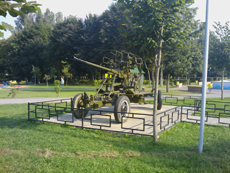 [+] maximize, 2048x1536, JPEG, 944 KB |
 [+] maximize, 2048x1536, JPEG, 744 KB |  [+] maximize, 2048x1536, JPEG, 469 KB |

Others
To cap it all, we made several screenshots of the preinstalled applications for you to easily understand, how insignificantly Windows Mobile 6.5 has changed since WM 6.1.



























Phone Quality
We have no complaints about the phone quality, as the antenna provides the signal reception comparable with the most devices of the company and slightly lugs behind the Hero and Touch 1. The earpiece traditionally boasts volume, which is high enough to speak either in the underground or at the noisy street. Plus, our guest has a good speech rendering quality. Thus the impression is absolutely positive. The loudspeaker doesn’t create the same great impression, as having the maximum loudness higher than the average level, it produces whizzes and creaks, instead of distinctive middle and low frequencies. The device features powerful vibration, which helps you not to miss a call, when, e.g. carrying it in your jeans.
Conclusion
HTC Touch 2 is a compact und inexpensive touchscreen device, which can compete with the fancier solutions by Samsung and Nokia and boast wider functional opportunities. Actually, it’s difficult to compare our guest with the rivals basing on some specific features, as in the end we can find an excuse for each possible drawback. But does it mean that this model will be the bargain for those, who are looking the best solution with a $430-500 price tag?
The answer is not so obvious. The device came to the market at the time, when all consumers are hoping to buy something with a great discount, while the $550 price would unlikely to lower. The company may not also be ready to occupy another niche, thus the amount of sales will be lower, than they have expected. But still HTC Touch 2 remains the simplest and rather interesting WM-based device of the company in 2009.
© Written by Tikhonov Valeriy, Mobiset.ru
Translated by Arina Urban.
Published — 14 November 2009.